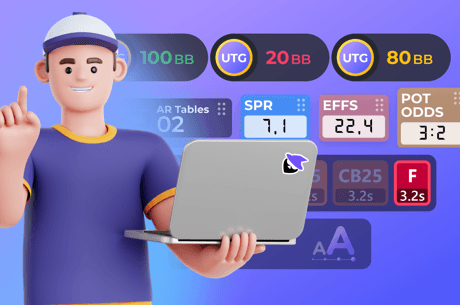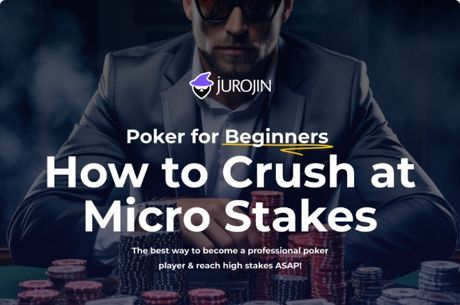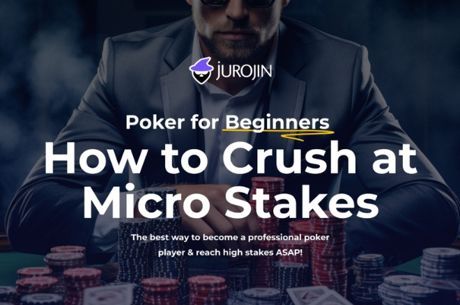Managing Your Bankroll with Jonathan Little: Part 2

Bankroll management is a vital skill that all poker pros must learn to be successful. In Part 1 of this article, Jonathan Little talked about the basics of bankroll management, his experiences, and his new teaching project whereby he plans to build a bankroll by starting with $300. In Part 2, he talks to PokerNews about a hand he played at the beginning of his bankroll project.
Game: No-Limit Hold’em Six-Max
Stakes: $0.05-$0.10
Lineup:
Seat 1: Anna_ ( $14.54 USD ) ― Big Blind $0.10
Seat 2: algida2 ( $18.60 USD )
Seat 3: gokku84 ( $4.43 USD )
Seat 4: JonLittle ( $17.09 USD )
Seat 5: 1sap1 ( $9.58 USD ) ― Button
Seat 6: tyson89 ( $15.66 USD ) ― Small Blind $0.05
What was your image like before this hand?
Well, my table image is always pretty crazy in these games. Since the players are so bad, you want to be playing as many hands as you profitably can. So my image was pretty loose-aggressive, which is good because you can get paid off if you actually do hit a hand.
Preflop Action: algida2 calls, gokku84 calls, JonLittle calls with 6♦6♣, 1sap1 calls, tyson89 calls from the small blind, and Anna_ checks the option in the big blind.
Why did you decide to overlimp here?
In general you don’t want to raise with a hand like pocket sixes here because you’re cutting down on your implied odds. Basically, if you can play the pot for one big blind, you can still get in 100 big blinds later. It’s much better than raising six big blinds preflop and 94 big blinds later. You’re not getting as good implied odds.
Also, in the low-stakes games, if someone makes top pair to your set, they’re going to stack off. It doesn’t really matter how much money is in the pot preflop. In higher-staked games, you’d have to get in more money preflop to get their whole stack when you flop a set, but even in those games, I would still limp. Then again, in higher games, guys aren’t limping as much, so I guess I wouldn’t be in that situation that often. But, if it folded to me, then I would raise. In this spot, after two people limped, I think it’s more profitable to try and limp behind to see a cheap flop.
What about the concepts of “punishing the limpers” and “isolating?”
I just think that the best option is limping because almost every flop will be bad for you. You will c-bet and get check-raised often and get bluffed off the best hand easily. If you limp and see a bad flop, you can easily fold and not worry that you are folding the best hand. It’s like a balancing act. One way, you’re trying to isolate and go up against one person, the other way, you’re playing against a lot of people, and you have to realize that the hand has different value each way you play it.
Flop Action: The flop comes J♣5♥6♥. tyson89 bets $0.10, Anna_ folds, algida2 calls, gokku84 raises to $1, JonLittle calls with middle set, and tyson89 calls.
Did you think about reraising here since it seems like a draw heavy board for a limped pot?
If someone raises to a $1 on a draw and I reraise, he’s probably not going to fold a draw. I’d get it in as a 65% favor, which is good, but if he has something like top pair, he may end up folding. If it goes bet, call, raise, reraise, top pair doesn’t look so good. If I just call, there’s more of a chance that he doesn’t fold top pair and just keeps on betting. So, with a reraise, you’re just going to force out a worse hand. The only thing raising does is help you out against draws, but when you flop a set in low-stakes games, you’re probably not going to fold anyway. If a heart does come on the turn, you can just go into call-down mode unless you get there. You might lose 50 big blinds or something. I’m giving up a free card in exchange for getting a lot of value out of top pair, and I think when a guy raises in that spot, he usually has something like top pair more so than a draw. If the guy behind has a draw, he’s still got getting great odds. If a heart comes on the turn, and they check to me, I’ll probably just check behind and call a river bet. I could just go into bluff-catching mode if the board makes a flush out there.
Also by just calling, one of the players left to act might think he or she has enough fold equity to make you fold your hand with a shove.
Yeah that’s true, but I don’t think these guys are thinking in terms of fold equity. I think they’re just thinking, “I have a draw, I’m just going to go all in.” But, you’re right. If the guy who min-bet or called has two pair, they might just shove. Just calling by me does open the door for people to make mistakes whereas if I raise, they really can’t make too huge of a mistake. The only mistake they can really make is getting it all in with a flush draw, and that isn’t that big of a mistake.
Turn Action: The turn comes the J♦. The board now reads J♣5♥6♥J♦. tyson89 checks, gokku84 goes all in for $3.33, JonLittle calls, and tyson89 calls.
Again, I just call here because if tyson89 has a jack, he’s going to get the rest of the money on the river, and if he has a draw, I want him to get there.
River Action: The river is the 8♣. The board now reads J♣5♥6♥J♦8♣. tyson89 checks and JonLittle goes all in for $12.66. tyson89 calls all in for his last $11.23. JonLittle shows 6♦6♣, tyson89 shows J♠10♦, and gokku44 mucks. JonLittle wins the pot.
What made you decide to go for an all-in instead of a smaller bet?
In this spot, tyson89 either has a busted draw, in which case he never calls anything, or he has a really good hand and he’s going to call anything I bet. Also, there is no real value in betting small to try and induce a bluff from a missed draw because micro-stakes players don’t really do that much. Of course, I have to go for max value.
I think the important part of the hand was not raising the flop. You would force out all the bad top pair hands which you really want in the pot since they have so little equity. I think a lot of guys would raise just because they have a set. Instead of only winning the one stack for $4, I won more than $20. That situation happens all the time. You have to allow players to make a big mistake.
Test out what you've learned by opening an online account today! And as always, follow us on Twitter for-up-to-the-minute news.









